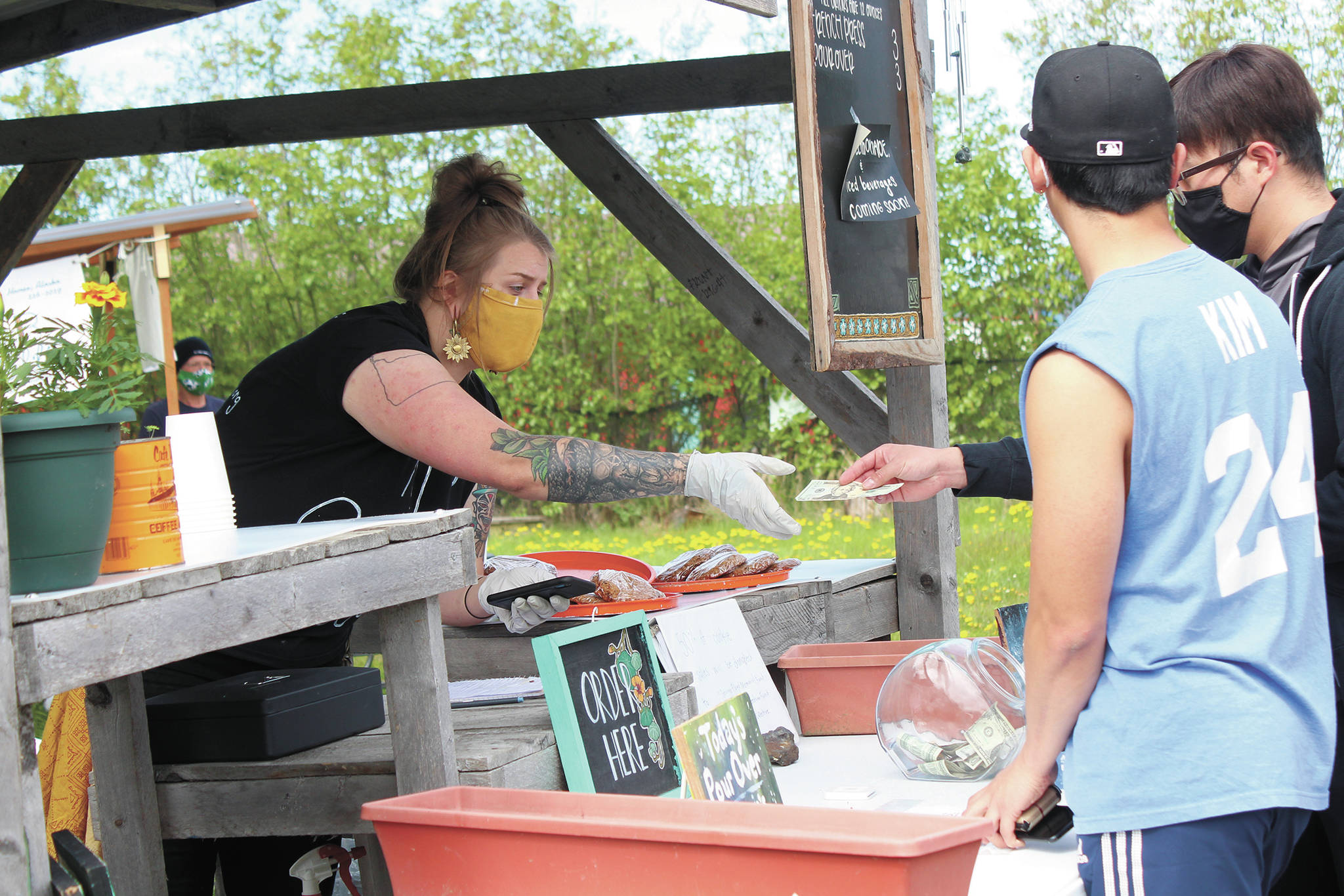As the Homer Farmers Market heads into COVID-19 pandemic season 2.0, it reopens again this Saturday, May 29, at its Ocean Drive location with the same dedicated food growers, but also back with craft and prepared food vendors. Saturday hours from 10 a.m.-3 p.m. and Wednesday hours from 3-5 p.m. harken back to the before times of 2019, too.
However, the market won’t have live music, activities for children and presentations like Chef at the Market. The large tent used for musicians and activities instead will be open for people to eat outdoors under shelter. The middle section that formerly had booths will be empty except for the market staff tent to give people more room to spread out as they line up for vendors.
One big change will be a new market director, Lauren Jerew, taking over under the mentorship of Robbi Mixon, the market director for the past 10 years. Mixon will help Jerew in the first few weeks and serve as needed.
“We’re trying to find an in between,” Jerew said in a phone interview last Friday. “We’re getting closer to a normal market. … We’re excited to bring back our crafters and our hot food vendors.”
That includes a relaxation of COVID-19 safety protocols while remaining conscious of the ever shifting track of the pandemic. New Centers for Disease Control and Prevention guidelines on wearing face masks and safer activities outdoors mean the market won’t require face masks this year, but recommends them. The CDC now says that fully vaccinated people don’t need to wear face masks outdoors, though it suggests them for unvaccinated people — more than half the Kenai Peninsula, according to the Alaska Department of Health and Social Services.
“We’re still requesting that folks wear masks,” Jerew said. “We’ll have masks on-site. We will not be mandating and enforcing it. It was a really traumatic experience for the staff (last year).”
Mixon said that in 2020 the Homer Farmers Market Board of Directors and staff sought the best advice from the CDC and the Alaska Department of Health and Social Services, with the goal of keeping customers and vendors safe.
“In general, I would say it worked out that way,” she said. “There were no outbreaks traced to the market.”
Many locals said they were thankful the market followed CDC protocols, Mixon said. Some people, however, challenged the face-mask mandate of 2020.
“It was damned if you do and damned if you don’t,” she said. “I don’t think we would have changed. There were a lot of unknowns, and we did the best we could with the information we had.”
Jerew said over the summer the staff and board will reevaluate policies and consider new health guidelines, with two meetings planned in June. She invited people to share concerns at the market booth.
“We’ll be meeting more and having these hard discussions as the season goes,” she said. “We know what’s happening locally right now, but how is it going to change as tourists come in?”
Now in Homer four years, Jerew has roots on the Kenai Peninsula. She’s related to the Mullen homesteading family in Soldotna, but grew up in Iowa. Jerew got her bachelor’s degree at the University of Iowa, Iowa City, and a master’s degree in business administration from Clarion University of Pennsylvania. She came to Homer to work with a cousin, Elaine Mullen, who owned Island Watch Vacation Rental.
In college, Jerew did an undergraduate fellowship around expanding access to food programs and food security.
“I found that to be fulfilling, which is why I felt this would be a good fit for me,” Jerew said.
Though she’s leaving her job as market director, Mixon remains involved in community agriculture. She’s the local foods director at Cook Inletkeeper and directs the Food Hub, an online market for peninsula growers to sell their products and have them picked up at a central location. Mixon also directs the Alaska Food Policy Council and the Alaska Farmers Market Association. In her 10 years she’s seen community agriculture boom.
New technology like high tunnels has extended the growing season and means produce comes to the table earlier. Programs like the Food Hub and CSAs have made it easier for households and restaurants to get fresh, locally grown food.
“I think we are seeing more people interested in buying local,” Mixon said. “There are new opportunities. There are more CSAs. We have more farms than ever.”
The pandemic also has made people more aware of how supply chains from the Lower 48 can be disrupted, Mixon said. Because tourism dropped last year, the farmers market saw few such visitors in 2020. Still, vendors reported decent sales. As with other markets, some vendors shifted to online or non-contact sales.
“A silver lining for our Food Hub — we had a 200% growth,” Mixon said.
The popularity of farmers markets in Alaska and nationally has led them to be community attractions for residents and visitors, a place not just to buy food, but to meet with friends and neighbors. In Homer that has caused some growing pains, like traffic jams on Ocean Drive and packed parking lots. The reset of the pandemic eased some of those problems.
“Our core mission is supporting farmers,” Mixon said. “… We’re getting back to the core. We’re a place to buy and sell locally made items.”
Looking back at 2020, Mixon said, “We did good. We held up our bargain with the community to keep them safe, and now we’re just moving forward — hopefully. We couldn’t ask for a better new director. Lauren has jumped in wonderfully. … It feels good to pass it on.”
Reach Michael Armstrong at marmstrong@homernews.com.

